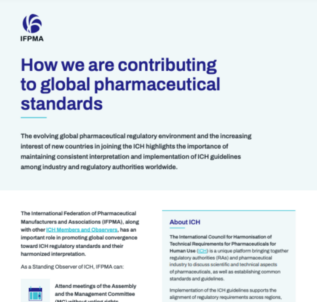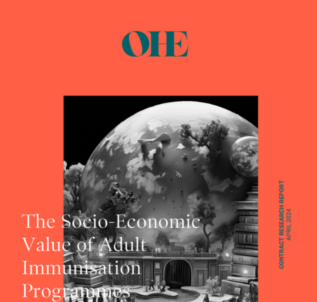WHA 69, Item 16.2: Follow-up to the report of the Consultative Expert Working Group
WHA 69, Item 16.2: Follow-up to the report of the Consultative Expert Working Group on Research and Development: Financing and Coordination
Delivered by Mario Ottiglio, Director, Public Affairs, Communications and Global Health Policy, IFPMA
Thank you for the opportunity to contribute to this important discussion today. IFPMA represents leading research-based pharmaceutical companies as well as national and regional industry associations across the world.
Moving forward on this debate means focusing on proposals which are practical, politically feasible, which complement the current innovation model and recognize the different roles that different stakeholders can play.
Intellectual property remains critically important to the development of new medicines. However, we have seen, over the past decade, a number of initiatives, new business models seeking to balance innovation and access that have brought positive outcomes in terms of patient access. These include product development partnerships, open innovation approaches, patent pooling, voluntary licenses to name a few. These models all operate at different points in the pharmaceutical innovation process, including at the stages of research & discovery, preclinical & clinical research and development, and post marketing & delivery.
It is critical in this process to have vision. But we need to mix this with a dose of science-based pragmatism: improvements are always possible; but we should focus on what can work.
We support the approach taken by TDR as this wants to take forward successful initiatives across R&D, sustainable financing, and cross-sector collaboration. It wants to scale these up to strengthen access to health worldwide.
When it comes to R&D, one-size-fits-all approaches will not work. We have learnt over the last 15 years of working in new collaborative approaches that real progress can be made to tackle innovation and access challenges as pointed out by the DG in her plenary speech to the Assembly. The progress made in tackling HIV, malaria, NTDs and other diseases are testament to this. Future Solutions must similarly be designed to meet specific problems. This reinforces the need for an effective coordination framework.
In discussing new approaches to finance and co-ordinate R&D it is important to remember the end game – patient access. While it is important to discuss frameworks and R&D models, overcoming barriers to access should be achieved through a holistic approach, addressing systemic issues such as financing for health, investing in health infrastructures, and enhancement of healthcare worker capacity, all of which are required to deliver UHC.
About IFPMA
The International Federation of Pharmaceutical Manufacturers and Associations (IFPMA) represents over 90 innovative pharmaceutical companies and associations around the world. Our industry’s almost three million employees discover, develop, and deliver medicines and vaccines that advance global health. Based in Geneva, IFPMA has official relations with the United Nations and contributes industry expertise to help the global health community improve the lives of people everywhere. For more information, visit ifpma.org.
Learn more





